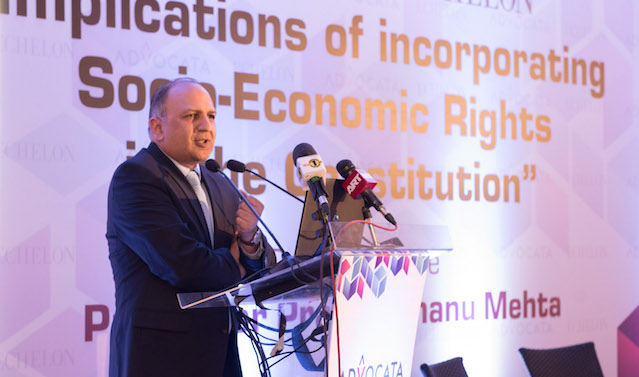Should We Have Socio-Economic Rights In The Constitution?
Thank you very much for that welcome, It’s great to be here in Colombo. I’ve always liked the quality of intellectual dialog here very good.
I was briefed that I should speak on incorporating socio economic rights in the constitution. What I’m going to do is try and develop a conversation.
I realize this is a subject of live and passionate debate in Sri Lanka. I’m not going to directly talk about the Sri Lankan constitution for two reasons. First, because I’m not equipped to do so. It requires an intricacy that I do not possess. Second, when thinking about constitutions in general the most important thing to realize is that a constitution is a social contract within a particular group of people. Because it is a social contract it has to reflect the historical specificity of that people’s values, goals, aspirations and identities. There isn’t as it a thing like a cookie-cutter template for constitution making.
I often joke that one thing that saved India is the fact that it didn’t have an army of constitutional consultants, in 1948 suggesting best case solutions from everything from federalism to separation of powers and human rights. Constitutions are social contracts, and part of what that means is that it needs to be legitimate in the eyes of the people who are going to be governed by that constitution. In that sense, the constitution and the choices you make about a constitution is fundamentally a political negotiation.
*Prof. Pratap Bhanu Mehta
 Always be very suspicious of anyone who tells you that there is such a thing called a “first-best” constitution; a conception of constitutional validity that’s independent of the legitimacy that the constitution exercises over its people. It’s up to your elected representatives and the people of Sri Lanka to, in a sense, negotiate their way into a settlement.
Always be very suspicious of anyone who tells you that there is such a thing called a “first-best” constitution; a conception of constitutional validity that’s independent of the legitimacy that the constitution exercises over its people. It’s up to your elected representatives and the people of Sri Lanka to, in a sense, negotiate their way into a settlement.
The test of an enduring constitution is simple: Ask the question “do all those governed by a constitution feel that it’s one that they have chosen?” And “are they exercising their rights as free and equal citizens?” It shouldn’t be up to experts or people with constitutional authority to prescribe an ideal form of a constitution.
What we could do is share what different experiences will look like, and what those experiences might mean when you think about a new constitution in Sri Lanka.
What I will speak on in the next 20 minutes or so is on the following:
- How should we frame the debates over economic and social rights in the constitution?
- About the Indian case and possible lessons from that for Sri Lanka or any other constitution making progress.
- End with a couple of suggestions regarding things to think about in the Sri Lankan debate.

